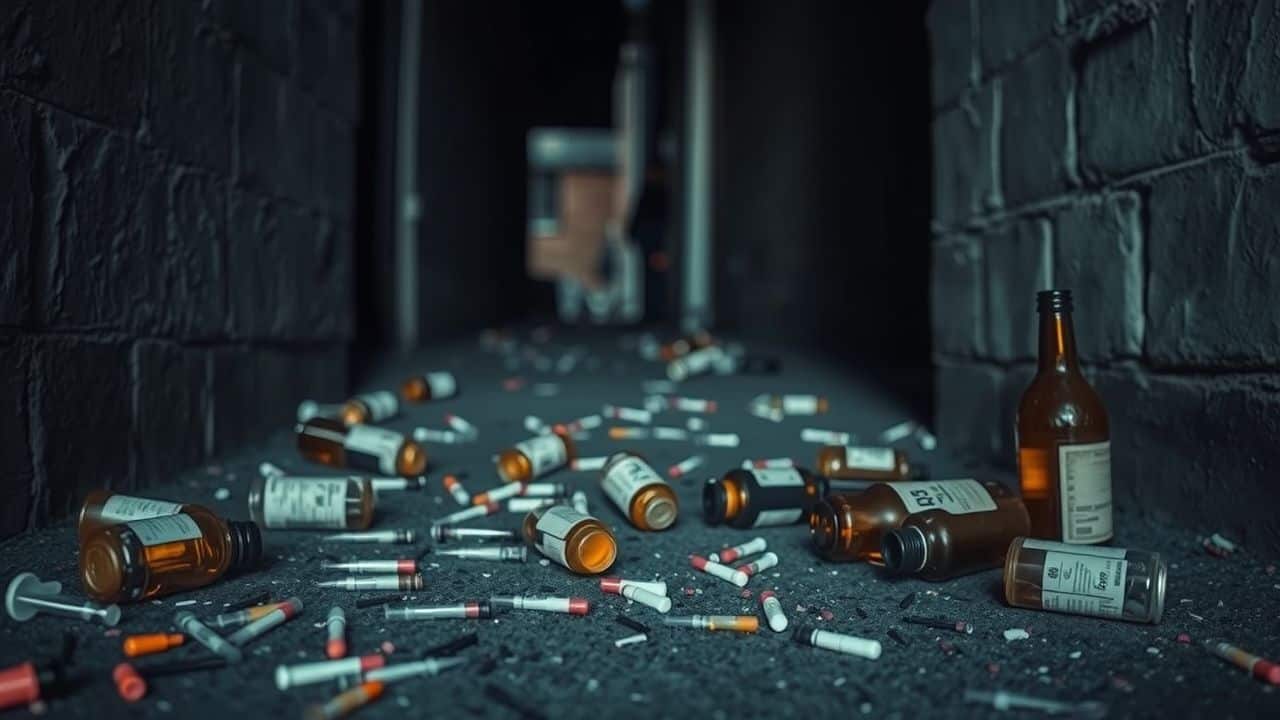Wondering how long it’ll take to kick that addiction? You’re not alone. Addiction recovery is different for everyone – like a fingerprint. This article will walk you through 9 key factors that shape your journey to sobriety.
Ready to take the first step?
Key Takeaways
Recovery time varies widely based on factors like addiction severity, substance type, and overall health. There’s no one-size-fits-all timeline.
The stages of recovery include precontemplation, contemplation, preparation, action, maintenance, and sometimes relapse. Advanced recovery can take years to achieve.
Detox length differs by substance – meth withdrawal lasts about 3 days, while alcohol detox takes around 10 days. Withdrawal symptoms may include shakes, aches, mood swings, and cravings.
Experts recommend at least 3 months in rehab for better outcomes. Programs focus on physical and mental health, coping skills, relapse prevention, and aftercare planning.
Ongoing support through groups like AA/NA, therapy, and developing healthy coping strategies is crucial for maintaining long-term sobriety and preventing relapse.
Table of Contents
Exploring Addiction Recovery

Addiction recovery isn’t a one-size-fits-all journey. It’s a personal path that looks different for everyone – kinda like how we all have our own favorite ice cream flavors. Recovery involves more than just quitting drugs or alcohol… it’s about rebuilding your life, step by step.
Defining addiction recovery

Recovery from addiction is about more than just stopping drug or alcohol use. It’s a path of change that begins when you quit and continues on. This process can be intimidating, and many people have fears in recovery.
But don’t worry! Your brain is incredible. It can repair and adapt, even after addiction has affected it.
Recovery is a path, not an endpoint.
Think of recovery like learning to ride a bike. At first, you might stumble often. But with practice, you improve. You’ll go through phases – from considering quitting to actually doing it and staying sober.
It’s not always simple, but it’s worthwhile. Keep in mind, you’re not alone in this. Many people have been in your shoes and emerged stronger.
Key stages of addiction recovery

Addiction recovery isn’t a straight path. Let’s break down the key stages you’ll face on your journey to wellness.
- Precontemplation: You’re not ready to change yet. Maybe you don’t see your substance use as a problem, or you’re scared to face life without it. It’s okay – we’ve all been there.
- Contemplation: You’re starting to think about change. You’re weighing the pros and cons of quitting. It’s like standing on the edge of a pool, not sure if you want to jump in.
- Preparation: You’ve decided to take action. You’re making plans, setting goals, and maybe even telling friends and family. It’s exciting and scary all at once.
- Action: This is where you put your plans into motion. You’re actively working to quit using substances. You might be in rehab, going to meetings, or working with a therapist. It’s tough, but you’re doing it!
- Maintenance: You’ve made it through the first hurdles. Now you’re focused on staying sober and building a new life. This stage can last from six months to five years or more.
- Relapse (optional): Slip-ups happen. If you relapse, don’t be too hard on yourself. It’s a chance to learn and come back stronger.
- Advanced Recovery: You’re living your best sober life. You’ve got new habits, healthy relationships, and a sense of purpose. The urge to use is mostly gone, but you stay aware.
These stages aren’t always linear. You might bounce back and forth or skip some entirely. That’s totally normal. The important thing is to keep moving forward, one day at a time.
Factors That Affect Recovery Time

Recovery time isn’t one-size-fits-all. It’s like a puzzle – lots of pieces need to fit together just right.
Severity of addiction
 Addiction severity varies from person to person. It’s like a scale, from mild to severe. Doctors check for specific signs to assess where someone stands. The more criteria met, the more challenging the situation might be.
Addiction severity varies from person to person. It’s like a scale, from mild to severe. Doctors check for specific signs to assess where someone stands. The more criteria met, the more challenging the situation might be.
But here’s the good news – even severe cases can improve with proper support.
Your recovery journey depends on your specific situation. If you’ve been using substances for a long time, it might take a bit longer to recover. But here’s the important part: no matter your starting point, progress is achievable.
It’s about taking that initial step and persevering. Ladies, you’ve got more strength than you realize!
Substance type influence
Different drugs affect your body in unique ways. Some substances, like meth, leave your system fast. You might feel better in just three days. But other drugs, like alcohol, can take longer.
Alcohol detox often lasts about ten days. It’s crucial to know these timelines when dealing with alcoholic parents or loved ones.
Your brain changes when you use drugs for a long time. Each substance rewires your brain’s reward system differently. This impacts how long it takes to feel normal again. For example, opioid withdrawal can last 4–10 days, while quitting benzos might take 1–4 weeks.
Knowing these facts helps you plan your recovery journey better.
Recovery is not a race. You don’t have to feel guilty if someone else bounces back faster.
Health factors impact
Your body plays a big role in how fast you recover from addiction. If you’re in good health, you’ll likely bounce back quicker. But if you’ve got other health issues, it might take longer.
Things like poor nutrition, lack of sleep, or chronic illnesses can slow down your healing process. It’s like trying to run a marathon with a sprained ankle – doable, but tougher.
Mental health is another key player. Anxiety, depression, or trauma can make recovery feel like an uphill battle. But don’t lose hope! With the right support and treatment, you can overcome these challenges.
Your journey is unique – some days will be easier than others. Let’s look at how different substances affect recovery time.
The Detox Phase

Detox can be rough – like a rollercoaster for your body and mind. It’s the first step to getting clean, but it’s not a walk in the park… you might feel pretty crummy for a while.
How long detox lasts
Detox time varies based on the drug and how long you’ve used it. For meth, most folks feel better after about three days. Alcohol’s a different story – it can take around ten days to get rid of those withdrawal symptoms.
But hey, you’re not alone in this! Your body’s working hard to get back to normal.
Drugs that stay in your system longer, like methadone, can make detox last longer. It’s tough, but it’s part of the healing process. Keep in mind, everyone’s journey is different. Some get through detox in a week, while others might need a bit more time.
The important thing is to stick with it and lean on your support system. You’ve got this!
Typical withdrawal symptoms
Withdrawal symptoms can hit hard when quitting drugs or alcohol. Let’s look at some common signs your body might show as it adjusts to life without substances:
- Shakes and tremors: Your hands might shake like you’ve had too much coffee.
- Muscle aches: Your body could feel sore, like after a tough workout.
- Appetite changes: You might feel starving one minute and sick at the thought of food the next.
- Extreme tiredness: Fatigue can knock you off your feet, making even simple tasks feel tough.
- Sweating buckets: You could wake up drenched, even in a cool room.
- Mood swings: Irritability and depression might come in waves, making you feel like an emotional rollercoaster.
- Seizures: In severe cases, your body might have uncontrolled movements. This is serious and needs medical help right away.
- Sleep troubles: Insomnia might keep you up all night, leaving you exhausted during the day.
- Cravings: Your mind might fixate on using again, making it hard to focus on anything else.
- Anxiety: Feeling on edge or panicky is common as your body adjusts to being substance-free.
Residential Rehab Programs

Rehab centers offer a safe haven for recovery. You’ll find support and structure 24/7 – it’s like a cocoon for healing.
Expected duration of stay
Rehab stays vary in duration. Most facilities offer 30, 60, or 90-day programs. Here’s the scoop – experts say longer stays are more effective. The National Institute on Drug Abuse supports this view.
They recommend at least three months for better outcomes.
I’ve been through it, and I understand. Ninety days can seem daunting at first. But believe me, time passes quickly in rehab. You’re occupied with therapy, group sessions, and acquiring new skills.
Soon enough, you’re more resilient and prepared to face life again. Keep in mind – recovery is a process, so give yourself the time you need.
Rehab program focus areas
Rehab programs tackle more than just quitting drugs or alcohol. They dig deep into the roots of addiction and help build a new, sober life.
- Physical health: Programs often start with medical care. They help your body heal from substance abuse. This might include nutrition plans and exercise routines.
- Mental wellness: Therapy is a big part of rehab. You’ll learn to understand your thoughts and feelings. Cognitive-behavioral therapy is common. It helps change harmful thinking patterns.
- Coping skills: Life can be tough. Rehab teaches you how to deal with stress without using. You might learn meditation or deep breathing techniques.
- Relapse prevention: Staying sober is hard work. Programs give you tools to avoid triggers. You’ll make plans for high-risk situations.
- Family healing: Addiction affects everyone around you. Many rehabs include family therapy. It helps rebuild trust and improve communication.
- Life skills: Some people need help with daily living. Programs might teach budgeting, job hunting, or cooking skills.
- Peer support: You’re not alone in recovery. Group therapy lets you connect with others. Many find this incredibly helpful.
- Aftercare planning: Recovery doesn’t end when rehab does. Good programs help you plan for life after. This might include outpatient therapy or support groups.
Options for Outpatient Treatment

Outpatient treatment offers flexibility for those juggling recovery with daily life. You can choose from part-time or full-time programs that fit your schedule and needs.
Program lengths and types
Outpatient programs offer flexible options for women seeking addiction help. These programs come in different lengths and types to fit your needs and lifestyle.
- Standard Outpatient Treatment: This option provides low to medium intensity care. You’ll attend up to 9 hours of treatment per week. It’s great for women with milder addictions or those transitioning from more intense programs.
- Intensive Outpatient Programs (IOP): These pack a bigger punch. You’ll get 10–20 hours of treatment weekly. IOPs work well if you need more support but can’t do full-time rehab.
- Partial Hospitalization Programs (PHP): Think of this as a step between inpatient and outpatient care. You’ll spend most days at the treatment center but go home at night. It’s perfect for gals who need lots of structure but have a stable home life.
- Evening Programs: These fit around your 9-to-5 job. You’ll attend therapy and groups after work hours. It’s ideal if you can’t take time off but need ongoing support.
- Weekend Programs: Some centers offer weekend-only treatment. You’ll pack your recovery work into Saturdays and Sundays. It’s a good choice for busy moms or career women.
- Long-term Outpatient Care: This can last months or even years. You’ll gradually reduce your treatment hours as you get stronger in recovery. It’s great for preventing relapse and building a sober life.
Part-time vs. full-time treatment comparison
Moving from program lengths and types, let’s compare part-time and full-time treatment options. These choices can significantly impact your recovery journey.
Part-time and full-time treatments offer different levels of care. Here’s a quick look at how they compare:
| Aspect | Part-time Treatment | Full-time Treatment |
|---|---|---|
| Time Commitment | 9–16 hours per week | 24/7 care |
| Living Arrangement | At home | At treatment center |
| Flexibility | More flexible schedule | Structured daily routine |
| Support Level | Moderate | Intensive |
| Cost | Generally lower | Usually higher |
| Best For | Mild to moderate addiction | Severe addiction or dual diagnosis |
Part-time treatment allows you to maintain your daily life. You can often work or care for family while getting help. It’s a good fit if you have a strong support system at home.
Full-time treatment provides constant care. It separates you from triggers and temptations. This option works well for those needing a complete reset.
Your choice depends on your needs and situation. Talk to a professional to determine what’s best for you. Each person’s recovery is unique. What’s important is finding what works for you.
Continuing Care and Support

Staying clean isn’t a one-and-done deal. You’ll need ongoing help and care to keep on track. Support groups like AA or NA can be your lifeline… they’re full of folks who’ve been in your shoes.
Plus, learning new coping skills is key – it’s how you’ll handle life’s curveballs without falling back into old habits.
Importance of sustained support
Staying sober isn’t a one-and-done deal. It’s a daily choice that gets easier with help. Think of it like learning to ride a bike – at first, you need training wheels and someone holding the back.
But as you keep at it, you gain balance and confidence. That’s where sustained support comes in. It’s your cheerleading squad, your safety net, and your compass all rolled into one.
I’ve seen firsthand how crucial ongoing support is. My friend Sarah struggled with alcohol for years. She’d quit, then slip up… over and over. But when she found a solid support system – a mix of AA meetings, therapy, and understanding friends – things clicked.
She’s been sober for 3 years now. It’s not always smooth sailing, but her support crew helps her weather the storms. They remind her why she started this journey and keep her focused on the prize: a healthier, happier life.
Strategies for long-term recovery
Sustained support lays the groundwork, but you need solid strategies to keep your recovery on track. Let’s dive into some proven tactics that can help you stay sober for the long haul.
- Build a strong support network: Surround yourself with people who get your journey. Join groups like Alcoholics Anonymous or Narcotics Anonymous. These folks have been there and can offer real-world advice.
- Learn your triggers: Figure out what makes you want to use. It could be stress, certain places, or even people. Once you know your triggers, you can plan how to avoid or deal with them.
- Develop healthy coping skills: Find new ways to handle stress and emotions. Try deep breathing, yoga, or talking to a friend. These skills can replace the urge to use drugs or alcohol.
- Stay busy and productive: Fill your time with meaningful activities. Take up a hobby, volunteer, or learn something new. Keeping your mind occupied helps fight off cravings.
- Practice self-care: Eat well, exercise, and get enough sleep. Taking care of your body helps your mind stay strong too. It’s amazing how much better you feel when you treat yourself right.
- Attend therapy regularly: Keep up with counseling sessions. Cognitive behavioral therapy can help you change negative thought patterns. It’s like a workout for your brain!
- Use mindfulness techniques: Stay present in the moment. Mindfulness can help you manage cravings and reduce stress. It’s a powerful tool in your recovery toolkit.
- Set realistic goals: Break your recovery into small, achievable steps. Celebrate each milestone, no matter how small. It’s all about progress, not perfection.
- Have a relapse prevention plan: Know what to do if you slip up. Have a list of people to call and steps to take. Being prepared can help you bounce back faster if things go south.
- Give back to others: Help someone else in recovery. Sharing your experience can strengthen your own resolve. Plus, it feels good to make a difference in someone’s life.
Psychological Treatments in Recovery

Therapy helps you heal your mind and beat addiction. You’ll learn new ways to deal with stress and stay sober.
Behavioral therapies employed
Behavioral therapies play a big role in addiction recovery. They help women change harmful thoughts and actions linked to drug use.
- Cognitive-Behavioral Therapy (CBT): This popular method teaches you to spot and change negative thinking. You’ll learn to handle tough situations without turning to drugs.
- Motivational Enhancement Therapy (MET): MET boosts your drive to change. It helps you find reasons within yourself to quit using and stay clean.
- Contingency Management: This approach uses rewards to encourage good behavior. You might get vouchers or prizes for staying drug-free.
- Family Therapy: Your loved ones join in to heal relationships and build a strong support system. It can help fix family issues that might lead to drug use.
- Dialectical Behavior Therapy (DBT): DBT teaches you to manage intense emotions. You’ll learn skills like mindfulness and how to tolerate distress.
- 12-Step Facilitation: This therapy gets you ready for programs like Alcoholics Anonymous. It helps you accept addiction as a disease and seek support.
- Matrix Model: This intense program combines several methods. It includes family education, skills training, and drug testing.
- Rational Emotive Behavior Therapy (REBT): REBT helps you spot irrational beliefs. You’ll learn to challenge these thoughts and replace them with healthier ones.
Psychological support methods
Psychological support plays a key role in addiction recovery. Let’s explore some effective methods that can help women on their journey to sobriety.
- Cognitive Behavioral Therapy (CBT): This method helps you spot negative thought patterns. You’ll learn to replace them with healthier ones, boosting your mood and behavior.
- Mindfulness Training: This teaches you to stay present and aware. It can reduce stress and cravings, making recovery easier.
- Group Therapy: Sharing with others who get it can be powerful. You’ll feel less alone and gain new insights from peers.
- Family Therapy: Healing relationships is crucial. This method helps mend bonds and build a strong support system at home.
- Motivational Interviewing: This approach boosts your drive to change. It helps you find your own reasons to stay sober.
- Art Therapy: Express yourself through creativity. It can help process emotions you might find hard to put into words.
- Dialectical Behavior Therapy (DBT): Learn to manage intense emotions. This method teaches skills like distress tolerance and interpersonal effectiveness.
- Eye Movement Desensitization and Reprocessing (EMDR): This can help heal trauma. It’s especially useful if past events trigger your substance use.
- Acceptance and Commitment Therapy (ACT): Learn to accept tough feelings without judgment. This can help you stay focused on your recovery goals.
These methods can be mixed and matched to fit your needs. Next, let’s look at how to spot and prevent relapse risks.
Understanding Relapse Risks

Relapse risks can sneak up on you like a cat in the night. They’re tricky… but knowing what to watch for can help you stay on track. Let’s dive into what might trip you up and how to keep your feet firmly on the recovery path.
Causes of relapse
Life throws curveballs, and sometimes they hit hard. Stress, old habits, or tough emotions can push folks back to their old ways. It’s like a drunk husband falling off the wagon after a bad day at work.
Isolation is a big red flag for relapse. When people cut themselves off from friends and family, they’re more likely to slip up. Feeling alone can make the urge to use stronger than ever.
Emotional ups and downs are another warning sign. If someone’s mood is all over the place, they might turn to drugs or booze to feel better. It’s a quick fix that often leads right back to square one.
Hanging out with old drinking buddies or visiting places tied to past drug use can also trigger a relapse. These familiar settings can stir up cravings that are hard to ignore. It’s crucial to spot these danger signs early and reach out for help before things spiral out of control.
Preventative strategies for relapse
Staying sober can be challenging. But with the right tools, you can overcome those urges and stay on track. Here’s a list of strategies to help you avoid relapse:
- Build a support network: Surround yourself with positive people who understand your journey. Join groups like AA or NA for extra support.
- Identify your triggers: Recognize what makes you want to use. It could be stress, certain places, or even some friends.
- Develop healthy coping skills: Try deep breathing, yoga, or a new hobby when cravings hit. These can replace old habits.
- Stay busy and active: Fill your day with enjoyable activities. Maybe volunteer, take a class, or start a garden.
- Practice self-care: Eat well, sleep enough, and exercise. A healthy body helps maintain a healthy mind.
- Use CBT techniques: Cognitive-behavioral therapy can help you change negative thoughts and behaviors.
- Consider medication: Some medications can reduce cravings. Talk to your doctor about options.
- Prepare for challenging situations: Think ahead about difficult scenarios. Have a strategy ready.
- Keep going to therapy: Regular check-ins with a counselor can address problems early.
- Find meaning in sobriety: Set goals and celebrate small wins. Remember why you started this journey.
Evaluating Recovery Success

Recovery success isn’t just about staying sober. It’s about living a full, happy life – and that looks different for everyone. Measuring progress can be tricky, but there are some clear signs to watch for…
like improved relationships, better health, and a renewed sense of purpose.
Indicators of short-term and long-term recovery
Short-term and long-term recovery have different signs of success. Let’s look at some key indicators that show progress in beating addiction:
- Improved physical health: You’ll notice better sleep, more energy, and fewer health issues. Your body starts to heal as you stay sober.
- Emotional stability: Mood swings become less frequent. You’ll feel more balanced and able to handle stress without turning to substances.
- Stronger relationships: You rebuild trust with loved ones. Healthy connections replace toxic ones tied to substance use.
- Better decision-making: Your choices align more with your values and goals. Impulsive behavior decreases as you think clearer.
- Increased productivity: Work or school performance improves. You’re more reliable and focused on your responsibilities.
- New hobbies and interests: Sober activities fill the void left by addiction. You find joy in things that don’t involve drugs or alcohol.
- Financial stability: Money management gets easier. You’re not spending on substances, so your finances improve over time.
- Improved self-esteem: You feel proud of your progress. Confidence grows as you overcome challenges without using.
- Coping skills development: You learn healthier ways to deal with stress and emotions. These tools help prevent relapse.
- Long-term goal setting: You start planning for the future. Dreams and aspirations become clearer as your mind clears.
- Consistent meeting attendance: Regular participation in support groups shows commitment to recovery. It’s a sign you’re actively working on staying sober.
- Helping others: As you progress, you may start supporting newcomers in recovery. This “giving back” is a strong indicator of long-term success.
These indicators show real progress in your recovery journey. Next, let’s explore the role personal and community support plays in maintaining sobriety.
The role of personal and community support
Personal and community support are key in addiction recovery. They’re like your cheerleaders, cheering you on every step of the way. Friends, family, and support groups give you a shoulder to lean on when things get tough.
They celebrate your wins and help you through the rough patches. It’s not just about having people around – it’s about having the right people who understand what you’re going through.
Recovery communities play a big part too. They’re full of folks who’ve been in your shoes. These groups offer a safe space to share, learn, and grow. Being part of a positive social network boosts your chances of staying sober.
It’s like having a whole team on your side, ready to catch you if you stumble. You’re not alone in this journey – your support system is there to help you thrive.
People Also Ask
How long does it take to recover from addiction?
Recovery time varies. It’s not a one-size-fits-all deal. Some folks bounce back quick, others need more time. Factors like the substance used, how long you’ve been hooked, and your support system play a big role. Remember, healing is a marathon, not a sprint.
What are the main factors that shape addiction recovery?
Nine key players shape your journey: the type of substance (like opioids or alcohol), how long you’ve been using, your mental health, support network, treatment approach, past relapses, stress levels, coping skills, and your commitment to change. It’s like a puzzle – each piece matters.
How do mental health conditions impact addiction recovery?
Mental health and addiction often go hand in hand, like peanut butter and jelly. Conditions like depression or anxiety can make recovery trickier. They’re like unwanted party crashers. Treating both at the same time is crucial for lasting sobriety.
What role does social support play in recovery?
Social support is your secret weapon. It’s like having a cheerleading squad. Family, friends, or support groups like Alcoholics Anonymous can make a world of difference. They’re your rock when the going gets tough, helping you dodge relapses and stay on track.
How do treatment approaches affect recovery time?
Treatment approaches are like different flavors of ice cream – what works for one person might not work for another. Options range from medical detox to behavioral therapy. Some folks swear by 12-step programs, others prefer SMART Recovery. Finding your perfect fit can speed up your journey.
Can relapses happen during recovery?
Relapses can happen, and that’s okay. They’re not the end of the world. Think of them as speed bumps, not roadblocks. Many people stumble before finding their footing. The key is learning from these slip-ups and using them to strengthen your resolve. Keep pushing forward!
References
https://www.psychologytoday.com/us/basics/addiction/recovery-addiction
https://www.ncbi.nlm.nih.gov/pmc/articles/PMC7215253/
https://www.racnj.com/the-five-stages-of-addiction-recovery/ (2024-05-14)
https://www.ncbi.nlm.nih.gov/pmc/articles/PMC1852519/
https://www.ncbi.nlm.nih.gov/pmc/articles/PMC10168177/
https://www.lotusbh.org/post/how-long-it-take-to-break-addiction
https://nida.nih.gov/publications/drugs-brains-behavior-science-addiction/treatment-recovery
https://www.ncbi.nlm.nih.gov/pmc/articles/PMC10379731/
https://www.perennialrecovery.com/blog/length-on-addiction-recovery
https://www.riseabovetreatment.com/how-long-does-a-drug-detox-take/
https://www.clearhavenrecovery.com/rehab-blog/how-long-is-a-detox/ (2024-04-26)
https://americanaddictioncenters.org/withdrawal-timelines-treatments (2024-08-16)
https://www.addictioncenter.com/rehab-questions/how-long-does-detox/
https://americanaddictioncenters.org/alcohol/rehab-treatment/how-long (2024-06-18)
https://www.coniferpark.com/blog/how-long-is-rehab (2024-03-22)
https://www.ncbi.nlm.nih.gov/pmc/articles/PMC5310811/
https://www.coniferpark.com/blog/outpatient-treatment-program
https://www.birchtreerecovery.com/blog/outpatient-treatment-duration (2023-09-20)
https://newchoicestc.com/blog/success-rates-outpatient-vs-inpatient-addiction-treatment-nc/
https://www.aristarecovery.com/blog/does-length-of-stay-matter-in-addiction-treatment
https://wishrehab.com/blog/the-importance-of-aftercare-in-sustaining-addiction-recovery
https://www.coniferpark.com/blog/aftercare-is-an-important-part-of-recovery
https://www.coniferpark.com/blog/steps-of-recovery-from-addiction
https://www.hazeldenbettyford.org/articles/relapse-risks-stats-and-warning-signs (2021-04-20)
https://safeharborrecovery.com/blog/top-causes-of-relapse/ (2020-05-11)
https://www.ncbi.nlm.nih.gov/books/NBK551500/
https://americanaddictioncenters.org/rehab-guide/relapse-prevention
https://addictionrehabcenters.com/recovery-timeline-in/ (2023-12-18)
